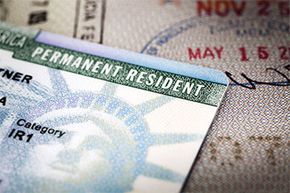Aliens are living among us. For all you know, your neighbor could be an alien, or the student sitting next to you in class, or the doctor writing your prescription. "Alien," after all, is the term that the United States government uses to describe anyone living in America who is not a U.S. citizen. By that measure, E.T. was not only an extraterrestrial, but also an alien.
A nation of immigrants, the U.S. welcomes foreign citizens to live legally as temporary or permanent workers, students, teachers, researchers and the occasional power forward for a professional basketball team.
Advertisement
The IRS also welcomes the tax dollars of foreigners living and working in the U.S. For tax purposes, the IRS distinguishes between non-U.S. citizens living in America permanently and those who are only visiting or studying in the U.S. temporarily:
- Resident aliens are taxed on both U.S. income and income from foreign sources, and file the same 1040 income tax return as U.S. citizens
- Nonresident aliens only pay taxes on U.S. income and are exempt in some cases from Social Security and Medicare contributions. Nonresident aliens file a modified 1040NR income tax return
How does the IRS determine who is a resident alien and who is a nonresident alien? There are two basic tests. If you pass either of these tests for any part of the tax year, you are a resident alien. If not, you're a nonresident alien [source: IRS]:
- "Green card" test – This one is easy. If you have been granted status as a Lawful permanent resident by the U.S. Citizenship and Immigration Services in the form of an alien registration card or "green card," then you are automatically considered a resident alien
- Substantial presence test – Get out your No. 2 pencils, because this one requires some math. The IRS considers you a resident alien if you lived in the U.S. for more than 183 days during the past three years. Instead of simply counting those days, the IRS gets tricky. First, count all of the days you lived in the U.S. this year. Then add one-third of the days you lived in the U.S. in the previous year. Lastly, add one-sixth of the days you lived in the U.S. the year prior to that. If the total is greater than 183, you are a resident alien, regardless of whether or not you have a green card
Keep reading to find out what kinds of tax breaks and exemptions are available to nonresident aliens, and to find out how much foreign athletes pay in taxes.
Advertisement



